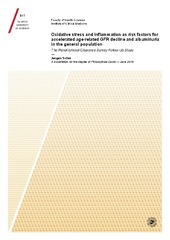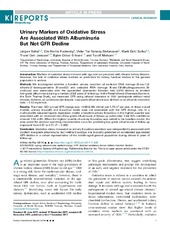| dc.contributor.advisor | Melsom, Toralf | |
| dc.contributor.author | Schei, Jørgen | |
| dc.date.accessioned | 2018-06-06T12:05:01Z | |
| dc.date.available | 2018-06-06T12:05:01Z | |
| dc.date.issued | 2018-06-08 | |
| dc.description.abstract | The prevalence of chronic kidney disease (CKD) increases rapidly with age, affecting more than one-third of people over 70 years old. The age-related glomerular filtration rate (GFR) decline is an important risk factor for CKD and kidney failure. Identifying novel risk factors for early kidney disease, manifested as accelerated GFR decline or low-grade albuminuria, may suggest underlying pathologic mechanisms for the development of CKD and prompt the opportunity for early-targeted treatment. Low-grade inflammation and oxidative stress are linked to aging and CKD. In particular, TNF receptors and urinary markers of oxidatively damaged nucleic acids have predicted GFR decline and albuminuria in people with diabetes. However, whether these biomarkers predict an accelerated GFR decline or albuminuria in the general population without CKD and diabetes remains unclear. The few previous studies from the general population are limited by the use of estimated GFR (eGFR), which is inaccurate and may be biased by non-GFR-related factors. In the Renal Iohexol Clearance Survey in Tromsø 6 (RENIS-T6), we measured the GFR (mGFR) in 1627 middle-aged people without cardiovascular disease, diabetes, or kidney disease. After a median follow-up of 5.6 years, 1324 participants underwent the same GFR measurements in the RENIS Follow-Up (RENIS-FU) study. In cross-sectional analyses from RENIS-T6, we found that the eGFR values based on creatinine and cystatin C were associated with inflammatory biomarkers independent of mGFR, indicating a non-GFR-related influence of inflammation on eGFR. In longitudinal analyses, we found that a higher baseline serum level of high-sensitivity C-reactive protein, but not of TNF receptor 2, was associated with an accelerated age-related mGFR decline and an increased risk of incident CKD. Markers of oxidative stress, measured as the urinary excretion of oxidatively damaged DNA and RNA (8-oxodG and 8-oxoGuo), were not significantly associated with the age-related mGFR decline, but higher urinary excretion of 8-oxoGuo predicted low-grade albuminuria at follow-up. Studies with an even longer observation period, multiple biomarkers, and repeated GFR measurements are needed to fully evaluate the effects of low-grade inflammation and oxidative stress on age-related GFR decline in the general population. | en_US |
| dc.description.doctoraltype | ph.d. | en_US |
| dc.description.popularabstract | The kidney is essential in several functions necessary for life, including filtration and excretion of waste products from the blood. The overall best measure of kidney function is the glomerular filtration rate (GFR).
Reduced GFR or chronic kidney disease affects nearly 10% of the world’s population and is a risk factor for cardiovascular disease, kidney failure and premature death. The GFR decline with age and is an important cause of the high prevalence of chronic kidney disease in old age. However, the age-related decline in GFR varies between individuals and it is unclear why some individuals maintain their kidney function in old age, while the GFR in others declines more rapidly and leads to chronic kidney disease. Identifying risk factors for a faster age-related GFR decline and albuminuria (marker of kidney damage) may prompt the opportunity to early and targeted treatment for the prevention of chronic kidney disease.
Inflammation and oxidative stress are closely linked to cardiovascular disease and chronic kidney disease. Biomarkers of inflammation and oxidative stress have predicted a faster GFR decline and albuminuria in people with diabetes. However, most of the previous studies are limited by the use of estimates of the GFR based on creatinine or cystatin C, which are inaccurate and may be biased by factors not related to the kidney function. Whether biomarkers of inflammation and oxidative stress predict a faster GFR decline or albuminuria in the general population without diabetes or established chronic kidney disease remains unclear.
We investigated the relationship of markers of oxidative stress and inflammation with the decline in GFR and albuminuria in a general population without diabetes, cardiovascular disease or chronic kidney disease. In the Renal Iohexol Clearance Survey Follow-up (RENIS-FU) study, we measured the GFR in 1627 middle-aged people and repeated the measurements in 1324 people after approximately 6 years. To the best of our knowledge, this is the largest longitudinal study with accurate measurements of GFR.
In the baseline analyses, we found that inflammatory biomarkers influenced the GFR estimated by creatinine and cystatin C independent of measured GFR, indicating non-GFR-related properties of inflammation on estimated GFR. In longitudinal analyses, we found that a higher level of inflammation was associated with a faster GFR decline and an increased risk of the development of chronic kidney disease. Markers of oxidative stress were not related to the age-related GFR decline but predicted albuminuria at follow-up.
Studies with an even longer observation period, multiple biomarkers, and repeated measurements of the GFR are needed to fully evaluate the effects of oxidative stress and inflammation on age-related GFR decline and albuminuria in the general population. | en_US |
| dc.description.sponsorship | Helse Nord | en_US |
| dc.description | The papers I & II are not available in Munin.<p>
Paper I: Schei, J., Stefansson, V.T.N., Mathisen, U.D., Eriksen, B.O., Solbu, M.D., Jenssen, T.G. & Melsom, T. (2016). Residual Associations of Inflammatory Markers with eGFR after Accounting for Measured GFR in a Community-Based Cohort without CKD. Available in <a href=https://doi.org/10.2215/CJN.07360715> Clinical journal of the American Society of Nephrology, 11(2), 280-286.</a> <p>
Paper II: Schei, J., Stefansson, V.T.N., Eriksen, B.O., Jenssen, T.G., Solbu, M.D., Wilsgaard, T. & Melsom, T. (2017). Association of TNF receptor 2 and CRP with GFR Decline in the General Nondiabetic Population. Available in <a href=https://doi.org/10.2215/CJN.09280916> Clinical journal of the American Society of Nephrology, 12(4), 624-634.</a> | en_US |
| dc.identifier.uri | https://hdl.handle.net/10037/12838 | |
| dc.language.iso | eng | en_US |
| dc.publisher | UiT The Arctic University of Norway | en_US |
| dc.publisher | UiT Norges arktiske universitet | en_US |
| dc.rights.accessRights | openAccess | en_US |
| dc.rights.holder | Copyright 2018 The Author(s) | |
| dc.subject.courseID | DOKTOR-003 | |
| dc.subject | VDP::Medisinske Fag: 700::Klinisk medisinske fag: 750::Nefrologi, urologi: 772 | en_US |
| dc.subject | VDP::Medical disciplines: 700::Clinical medical disciplines: 750::Nephrology, urology: 772 | en_US |
| dc.subject | The Tromsø Study | |
| dc.subject | Tromsøundersøkelsen | |
| dc.title.alternative | The Renal Iohexol Clearance Survey Follow-Up Study | en_US |
| dc.title | Oxidative stress and inflammation as risk factors for accelerated age-related GFR decline and albuminuria in the general population | en_US |
| dc.type | Doctoral thesis | en_US |
| dc.type | Doktorgradsavhandling | en_US |


 English
English norsk
norsk
